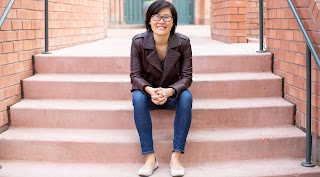Jennifer Baker: Publishing, Writing, and Representation
New MFA faculty member Jennifer Baker is a Pushcart-Prize-nominated writer, contributor for the digital publisher Electric Literature, founder of the podcast, Minorities in Publishing, and editor of the anthology Everyday People: The Color of Life. Baker has taught at conferences and in workshops; this is her first faculty position.
“I'm eager to engage with a concrete community over the course of the
semester,” she says. “I feel like the dynamics in a workshop can build a firm
sense of approach for not only participants, but for the ones leading
discussion and critique. Instructors learn so much from students in workshops
that it becomes a very reciprocal space for the exchange of ideas.”
Baker is teaching the
course Creative Nonfiction Writing II: Art of the Essay. “Barely There,” her
lauded piece published in Longreads last year, demonstrates mastery in bringing
the reader into an essay viscerally.
“My
focus was on hair more so than the body, even though hair is part of your body.
I knew I wanted to discuss hair in a different way, one that didn't focus on
the much-treaded discussion of the hair on my head,” she says. “And that's when
critique partners helped me see that the piece wasn't just about hair, but the
body and expectation, more so how societal expectations result in personal
preferences.”
Her work as a writer and editor
makes her an empathetic instructor. “If
I weren't a writer, I might not think so much about how writers react and
approach their writing because I'd be looking at things from one lens. When you
not only produce work, but edit work, and then also engage with people from the
idea to the final product you can really see and relate to how the writer's
mind works.”
“My editing style is on par with my writing style in that I ask many questions, most primarily ‘What is this about?’” Baker continues: “‘What's my aim here? Who am I speaking to? What do I want to leave readers with at the end of this piece?’” Digging deep for answers to those questions, she reminds writers that there is no one way to tell a story or organize a narrative. “You can be experimental, direct, linear, or epistolary,” she says. “I like to work out methodology as well as reasoning in my work, and with those I work with in the instructional space or publishing space.”
Baker is committed to
shining a light on underrepresented voices in literature and publishing. “The industry has a lot of work to do, but Minorities
in Publishing really aims to showcase that we're here, and there's always going
to be space for us,” Baker says. “[My podcast] started out and continues to be
a place for people to learn and know that there are many, many people of
various backgrounds in the industry doing this work for various reasons. I
really didn't think I'd still be doing it six years and more than 100 episodes
later. It’s become part of my identity.”
There is clearly much
work still to be done. “I've seen
publishing focus on the moment rather than the long game. Have there been more
acquisitions of books by and about BIPOC?” Baker asks. “Sure. But what were
those numbers before, and how steadily will this continue?”
For the anthology, Everyday People, she says, “The biggest thing for me was to ensure I was
creating an anthology focusing on BIPOC authors and perspectives that was not
centering trauma that comes from being a specific identity. I wanted the full
swath of the human experience, as cliché as that may sound, which centered
BIPOC writers and allowed you to relate to them—no matter the micro and macro
issues they're going through in their life—and to see different approaches in
storytelling in style, voice, structure, and aims.” And she did, as discussed
in an interview for epiphany.
In
Baker’s editing and in her own writing, she serves as an example to her future
students of how to go both wide and deep, paying keen attention to both the
self and the wider world—and our place in it.



Comments
Post a Comment